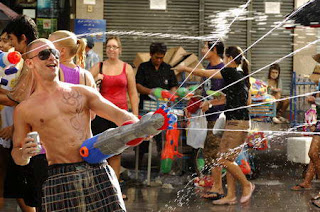Songkran is a Thai traditional New Year which starts on April 13 every year and lasts for 3 days.People will celebrate Songkran Day by throwing the water or water guns. It is also known as the "Water Festival" as people believe that water will wash away bad luck.But the purposed of thai adults are they want people to come home to visit their parents, pay respect to them, and usually bring them a small gift. People go to the temple to pray and give food to monks. They also clean the Buddha images in temples with water and gentle Thai perfume
 |
| SONGKRAN |
 |
| SONGKRAN |
In the midst of parades and street parties, people customarily douse each other with buckets of water and handfuls of baby powder. In Thailand, this is the festival that people spends months looking forward to, and it's a celebration that visitors are lucky to witness. Social decorum is thrown to the wayside, public revelry/drunkenness becomes a norm, and those conspicuous sweat stains on your T-shirts will no longer be a cause for embarrassment once the water start flying.
 |
| SONGKRAN |
Celebrants take no exception, whether you're a businessman or backpacker, every person on the street is a target for buckets of water or high-tech waterguns wielded by children. In most of Thailand, this holiday lasts for three or four days, but Chiang Mai becomes the Bourbon Street of the country, with festivities lasting up to nine days.
 |
| SONGKRAN |
The custom of throwing water originated as a sign of respect. Traditionally, communities would pay respect to elders and children to parents by sprinkling water on their hands as a cleansing of bad fortune and gesture of good luck. However, people may sometimes bypass the traditions of the ritual as they get caught up in the fun. After all, Songkran takes place during the peak of Thailand's dry season; the hottest time of the year. Though Songkran has fast become a nonstop party of Animal House proportion, the origins of the festival are rooted in the home. Traditionally, the holiday was about honouring parents and elders, with children coming home to see their families and offer gifts to them.
 |
| SONGKRAN |







ไม่มีความคิดเห็น:
แสดงความคิดเห็น